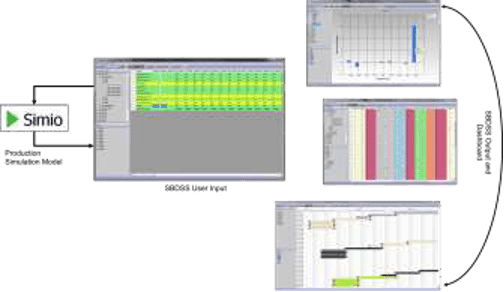Accomplishments/Payoff
Discrete Event Simulation is a powerful tool for modeling and analyzing production systems to improve throughput and unit cost. However, the ability to rapidly conduct what-if analyses and semi-automatically generate production schedules is limited due to a high level of manual interaction required by simulation software.
In this project, the Simulation-Based Decision Support System (SBDSS) was developed as an intelligent interface to simulation software with the objective of increasing the number of analyses that could be generated. The DSS was integrated with the Enterprise Production Model (EPM), a detailed discrete event simulation model built within Simio simulation software and used to simulate resource requirements in support of future schedules / schedule changes. The SBDSS allows for loading current F-35 production data and aircraft delivery dates. It then iteratively and intelligently exercises the underlying EPM simulation model to create feasible, efficient production resource plans. The tool provides graphical outputs to the analyst and decision makers, which enables them to effectively generate and evaluate the production schedules.
Implementation and Technology Transfer:

The SBDSS, integrated with EPM, was developed and successfully demonstrated at Lockheed Martin Ft. Worth. The SBDSS software was initially transitioned in FY12Q3 and subsequent releases through FY13Q4. The SBDSS tool has been installed and is being used to demonstrate a paradigm shift between resource planning and scheduling at LMAC: simulation-based resource planning may occur rapidly and proactively to mitigate schedule disruptions.
Implementation of the tool and overall scheduling paradigm is expected in FY14Q4 initially benefiting the JSF program and potentially extending to other Lockheed Martin business units.
Expected Benefits and Warfighter Impact:
- Enables “what-if” analyses for improved planning that will reduce the number and length of production delays.
- The SBDSS facilitates advanced planning techniques: risk mitigation plans, production optimization plans, scheduling improvement plans.

